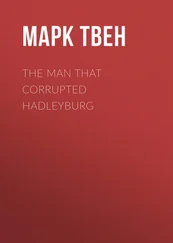Mark Twain - The Man That Corrupted Hadleyburg and Other Stories
Здесь есть возможность читать онлайн «Mark Twain - The Man That Corrupted Hadleyburg and Other Stories» весь текст электронной книги совершенно бесплатно (целиком полную версию без сокращений). В некоторых случаях можно слушать аудио, скачать через торрент в формате fb2 и присутствует краткое содержание. Год выпуска: 2004, Жанр: Классическая проза, Юмористическая проза, на английском языке. Описание произведения, (предисловие) а так же отзывы посетителей доступны на портале библиотеки ЛибКат.
- Название:The Man That Corrupted Hadleyburg and Other Stories
- Автор:
- Жанр:
- Год:2004
- ISBN:нет данных
- Рейтинг книги:4 / 5. Голосов: 1
-
Избранное:Добавить в избранное
- Отзывы:
-
Ваша оценка:
- 80
- 1
- 2
- 3
- 4
- 5
The Man That Corrupted Hadleyburg and Other Stories: краткое содержание, описание и аннотация
Предлагаем к чтению аннотацию, описание, краткое содержание или предисловие (зависит от того, что написал сам автор книги «The Man That Corrupted Hadleyburg and Other Stories»). Если вы не нашли необходимую информацию о книге — напишите в комментариях, мы постараемся отыскать её.
The Man That Corrupted Hadleyburg and Other Stories — читать онлайн бесплатно полную книгу (весь текст) целиком
Ниже представлен текст книги, разбитый по страницам. Система сохранения места последней прочитанной страницы, позволяет с удобством читать онлайн бесплатно книгу «The Man That Corrupted Hadleyburg and Other Stories», без необходимости каждый раз заново искать на чём Вы остановились. Поставьте закладку, и сможете в любой момент перейти на страницу, на которой закончили чтение.
Интервал:
Закладка:
'Return it to its receptacle. We deal with the mind only, not with its dumb servants.'
I could not offer my pulse, because the connection was broken; but she detected the apology before I could word it, and indicated by a negative tilt of her head that the pulse was another dumb servant that she had no use for. Then I thought I would tell her my symptoms and how I felt, so that she would understand the case; but that was another inconsequence, she did not need to know those things; moreover, my remark about how I felt was an abuse of language, a misapplication of terms—
'One does not feel,' she explained; 'there is no such thing as feeling: therefore, to speak of a non-existent thing as existent as a contradiction. Matter has no existence; nothing exists but mind; the mind cannot feel pain, it can only imagine it.'
'But if it hurts, just the same—'
'It doesn't. A thing which is unreal cannot exercise the functions of reality. Pain is unreal; hence pain cannot hurt.'
In making a sweeping gesture to indicate the act of shooing the illusion of pain out of the mind, she raked her hand on a pin in her dress, said 'Ouch!' and went tranquilly on with her talk. 'You should never allow yourself to speak of how you feel, nor permit others to ask you how you are feeling: you should never concede that you are ill, nor permit others to talk about disease or pain or death or similar non-existences in your preserve. Such talk only encourages the mind to continue its empty imaginings.' Just at that point the Stubenmadchen trod on the cat's tail, and the cat let fly a frenzy of cat-profanity. I asked with caution:
'Is a cat's opinion about pain valuable?'
'A cat has no opinion; opinions proceed from the mind only; the lower animals, being eternally perishable, have not been granted mind; without mind opinion is impossible.'
'She merely imagined she felt a pain—the cat?'
'She cannot imagine a pain, for imagination is an effect of mind; without mind, there is no imagination. A cat has no imagination.'
'Then she had a real pain?'
'I have already told you there is no such thing as real pain.'
'It is strange and interesting. I do wonder what was the matter with the cat. Because, there being no such thing as real pain, and she not being able to imagine an imaginary thing, it would seem that God in his Pity has compensated the cat with some kind of a mysterious emotion useable when her tail is trodden on which for the moment joins cat and Christian in one common brotherhood of—'
She broke in with an irritated—
'Peace! The cat feels nothing, the Christian feels nothing. Your empty and foolish imaginings are profanation and blasphemy, and can do you an injury. It is wiser and better and holier to recognise and confess that there is no such thing as disease or pain or death.'
'I am full of imaginary tortures,' I said, 'but I do not think I could be any more uncomfortable if they were real ones. What must I do to get rid of them?'
'There is no occasion to get rid of them, since they do not exist. They are illusions propagated by matter, and matter has no existence; there is no such thing as matter.'
'It sounds right and clear, but yet it seems in a degree elusive; it seems to slip through, just when you think you are getting a grip on it.'
'Explain.'
'Well, for instance: if there is no such thing as matter, how can matter propagate things?'
In her compassion she almost smiled. She would have smiled if there were any such thing as a smile.
'It is quite simple,' she said; 'the fundamental propositions of Christian Science explain it, and they are summarised in the four following self-evident propositions: 1. God is All in all. 2. God is good. Good is Mind. 3. God, Spirit, being all, nothing is matter. 4. Life, God, omnipotent Good, deny death, evil sin, disease. There—now you see.'
It seemed nebulous: it did not seem to say anything about the difficulty in hand—how non-existent matter can propagate illusions. I said, with some hesitancy:
'Does—does it explain?'
'Doesn't it? Even if read backward it will do it.'
With a budding hope, I asked her to do it backward.
'Very well. Disease sin evil death deny Good omnipotent God life matter is nothing all being Spirit God Mind is Good good is God all in All is God. There—do you understand now?
'It—it—well, it is plainer than it was before; still—'
'Well?'
'Could you try it some more ways?'
'As many as you like: it always means the same. Interchanged in any way you please it cannot be made to mean anything different from what it means when put in any other way. Because it is perfect. You can jumble it all up, and it makes no difference: it always comes out the way it was before. It was a marvellous mind that produced it. As a mental tour de force it is without a mate, it defies alike the simple, the concrete, and the occult.'
'It seems to be a corker.'
I blushed for the word, but it was out before I could stop it.
'A what?'
'A—wonderful structure—combination, so to speak, or profound thoughts—unthinkable ones—un—'
'It is true. Read backwards, or forwards, or perpendicularly, or at any given angle, these four propositions will always be found to agree in statement and proof.'
'Ah—proof. Now we are coming at it. The statements agree; they agree with—with—anyway, they agree; I noticed that; but what is it they prove—I mean, in particular?'
'Why, nothing could be clearer. They prove: 1. GOD—Principle, Life, Truth, Love, Soul, Spirit, Mind. Do you get that?'
'I—well, I seem to. Go on, please.
'2. MAN—God's universal idea, individual, perfect, eternal. Is it clear?'
'It—I think so. Continue.'
'3. IDEA—An image in Mind; the immediate object of understanding. There it is—the whole sublime Arcana of Christian Science in a nutshell. Do you find a weak place in it anywhere?'
'Well—no; it seems strong.'
'Very well. There is more. Those three constitute the Scientific Definition of Immortal Mind. Next, we have the Scientific Definition of Mortal Mind. Thus. FIRST DEGREE: Depravity. 1. Physical—Passions and appetites, fear, depraved will, pride, envy, deceit, hatred, revenge, sin, disease, death.'
'Phantasms, madam—unrealities, as I understand it.'
'Every one. SECOND DEGREE: Evil Disappearing. 1. Moral—Honesty, affection, compassion, hope, faith, meekness, temperance. Is it clear?'
'Crystal.'
'THIRD DEGREE: Spiritual Salvation. 1. Spiritual—Faith, wisdom, power, purity, understanding, health, love. You see how searchingly and co-ordinately interdependent and anthropomorphous it all is. In this Third Degree, as we know by the revelations of Christian Science, mortal mind disappears.'
'Not earlier?'
'No, not until the teaching and preparation for the Third Degree are completed.'
'It is not until then that one is enabled to take hold of Christian Science effectively, and with the right sense of sympathy and kinship, as I understand you. That is to say, it could not succeed during the process of the Second Degree, because there would still be remains of mind left; and therefore—but I interrupted you. You were about to further explain the good results proceeding from the erosions and disintegrations effected by the Third Degree. It is very interesting: go on, please.'
'Yes, as I was saying, in this Third Degree mortal mind disappears. Science so reverses the evidence before the corporeal human senses as to make this scriptural testimony true in our hearts, "the last shall be first and the first shall be last," that God and His idea may be to us—what divinity really is, and must of necessity be—all-inclusive.'
'It is beautiful. And with that exhaustive exactness your choice and arrangement of words confirms and establishes what you have claimed for the powers and functions of the Third Degree. The Second could probably produce only temporary absence of mind, it is reserved to the Third to make it permanent. A sentence framed under the auspices of the Second could have a kind of meaning—a sort of deceptive semblance of it—whereas it is only under the magic of the Third that that defect would disappear. Also, without doubt, it is the Third Degree that contributes another remarkable specialty to Christian Science: viz., ease and flow and lavishness of words, and rhythm and swing and smoothness. There must be a special reason for this?'
Читать дальшеИнтервал:
Закладка:
Похожие книги на «The Man That Corrupted Hadleyburg and Other Stories»
Представляем Вашему вниманию похожие книги на «The Man That Corrupted Hadleyburg and Other Stories» списком для выбора. Мы отобрали схожую по названию и смыслу литературу в надежде предоставить читателям больше вариантов отыскать новые, интересные, ещё непрочитанные произведения.
Обсуждение, отзывы о книге «The Man That Corrupted Hadleyburg and Other Stories» и просто собственные мнения читателей. Оставьте ваши комментарии, напишите, что Вы думаете о произведении, его смысле или главных героях. Укажите что конкретно понравилось, а что нет, и почему Вы так считаете.










